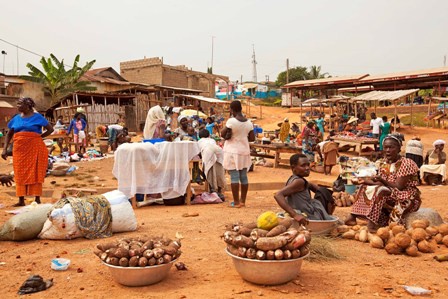The Ghana Standards Board on Thursday warned that leftover food served by vendors could pose health risks to customers.
It said this was because these foods were not usually preserved well.
"These left over foods, especially those sold the next day and those mixed with new food, when not properly handled may pose a public health hazard as a result of the growth of infectious or toxigenic microorganisms," Mr Alex Ntiforo, Deputy Executive Director, GSB said.
He said a survey conducted by the Board revealed that some food vendors sold leftover food or mixed them with newly prepared ones.
He was presenting a paper titled "Street food situation in Ghana" at a round table conference in Accra.
The conference on "Street Foods in Ghana: Types, Environment, Patronage, Laws and Regulation" was organised by Reseau Ghannee of SADAOC Foundation with support from the Netherlands government.
SADAOC is a French acronym for "Network of Sustainable Food Security in Central West Africa". The network covers five countries - Ghana, Burkina Faso, Cote d'Ivoire, Mali and Togo.
Mr Ntiforo said if there were proper ways of preserving food, these problems would be minimised.
He said although the authorities have for years been discouraging the use of firewood in the campaign against desertification, the practice of using LPG gas has remained unpopular with street vendors.
He attributed this to the cost of gas and "probably the lack of proper marketing strategy/research on the part of the oil companies."
Mr Ntiforo said if the usage of LPG was popular among the food vendors, food would always be warm adding that when it was not sold out it would also not be kept in the present prevailing conditions.
He called on the Accra Metropolitan Assembly to provide refrigeration facilities where possible for food vendors for a fee.
Mr Ntiforo said areas that record high activities of street food vending should be provided with basic support infrastructure such as appropriate stalls with adequate garbage and waste disposal systems, sanitary facilities and supply of potable water and electricity.
This is because most vendors never wash their plates and other utensils under running water and the water used was changed only when found to be dirty or at the close of day.
Mr Ntiforo called for the formation of food vending associations that could enforce a code of practice based on bylaws enacted with their involvement.
"Additionally, formation of the association would promote effective contact between themselves and food control agencies."
Dr A. Wayo Seini of the Institute of Statistical, Social and Economic Research (ISSER), University of Ghana, Legon, said the issue of street vendors had to be analysed critically because street food was now an integral part of the life of the average Ghanaian.
"The issue of street food is no longer an issue of the poor in society since all classes of people within our society now partake in street food as a meal or a snack at any point of the day.
"Street foods cater for the food needs of many, particularly, out of home workers, school children, travellers, transitory migrants, itinerant traders among many others."
He said because it was convenient for busy households that could not prepare food at home, particularly for school children and those who leave for work very early in the morning it was essential that food sold off the street met the highest standards set by the law enforcers.
Dr Victor Kwame Nyanteng, Chairman Reseau Ghaneen, said in the past food vendors were looked at negatively in terms of sanitation and health, but the workshop was aimed at supporting the growth of the sector.It should be viewed as a business sector that needed to be supported to grow bearing in mind the health of its stakeholders, who were the consumers.
He said the workshop would gather all the recommendations from reports, research and other academic work on food vendors to be forwarded to policy makers to make the business the number one fast food joint for Ghanaians and visitors.
The about 30 participants were from the Food and Drugs Board, Ghana Food Research Institute, Ghana Standards Board, the Accra Metropolitan Assembly and its health department, researchers from the University of Ghana Home Science Department and ISSER.
General News of Sunday, 9 September 2001
Source: GNA
The Danger of Left Over Food













